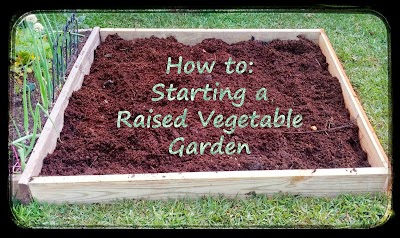How To: Starting a Raised Vegetable Garden
1. You can get great drainage for the soil, especially good for me in south louisiana where we have swampy ground.
2. You can start your garden off with great dirt rather than slowly building up the natural soil over several years.
3. The weeding is slim to none! (That's a good enough reason right there!)
First, lay out the dimensions of the garden. My extension will be 5 feet by 5 feet. You don't want to make it wider that 5 feet, otherwise you won't be able to reach the plants in the middle unless you make rows, but those waste too much space in a small backyard garden. Once you have decided on the size, mark out the area on the ground and use a flat shovel to dig up the grass.
This really is the hardest part. Digging up grass is no fun and a lot of work, but it has to be done, so just think about all those tasty homegrown vegetables and do it! I have discovered that the easiest way is to dig the shovel in a few inches deep around the whole perimeter and then do the same thing in one foot wide lines across the inside, then peel up each one foot wide section in rows.
If you use this method, the grass should come up in pretty nice chunks of sod that you can then reuse in low or dead spots in the yard.
Give yourself plenty of time and breaks for water, but if you stick with it, sooner or later all of the grass will be gone!
If you want to really keep the weeds and grass from growing back, you can line the bottom of the bed with weed fabric. I have noticed that this keeps some of the plants from growing deep roots and producing as well, so I opt for lining the bottom with a layer of cardboard. It kills any remaining weeds or grass and decomposes after about 18 months. I layer my compost and leaves on top on the cardboard, then bagged rich soil, and finally finish it off with top soil. Be sure to fill your raised bed to the top for the best growing conditions. Now all you need are some plants :)






Comments
Post a Comment